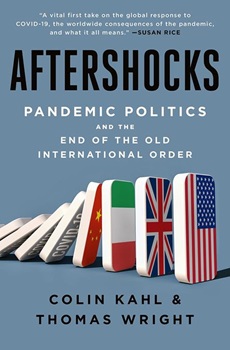Description
Two of America's leading national security experts offer the most definitive account of the global impact of COVID-19 and the political shock waves it will have on the US and the world order in the 21st Century. “Informed by history, reporting, and a truly global perspective, this is an indispensable first draft of history and blueprint for how we can move forward.” —Ben Rhodes The COVID-19 crisis is the greatest shock to world order since World War II. Millions have been infected and killed. The economic crash caused by the pandemic is the worst since the Great Depression, with the International Monetary Fund estimating that it will cost over $9 trillion of global wealth in the next few years. Many will be left impoverished and hungry. Fragile states will be further hollowed out, creating conditions ripe for conflict and mass displacement. Meanwhile, international institutions and alliances already under strain before the pandemic are teetering, while the United States and China, already at loggerheads before the crisis, are careening toward a new Cold War. China’s secrecy and assertiveness have shattered hopes that it will become a responsible stakeholder in the international order. Colin Kahl and Thomas Wright's Aftershocks is both a riveting journalistic account of one of the strangest years on record and a comprehensive analysis of the pandemic’s ongoing impact on the foundational institutions and ideas that have shaped the modern world. This is the first crisis in decades without a glimmer of American leadership and it shows—there has been no international cooperation on a quintessential global challenge. Every country has followed its own path—nationalizing supplies, shutting their borders, and largely ignoring the rest of the world. The international order the United States constructed seven decades ago is in tatters, and the world is adrift. None of this came out of the blue. Public health experts and intelligence analysts had warned for a decade that a pandemic of this sort was inevitable. The crisis broke against a global backdrop of rising nationalism, backsliding democracy, declining public trust in governments, mounting rebellion against the inequalities produced by globalization, resurgent great power competition, and plummeting international cooperation. And yet, there are some signs of hope. The COVID-19 crisis reminds us of our common humanity and shared fate. The public has, for the most part, responded stoically and with kindness. Some democracies—South Korea, Taiwan, Germany, New Zealand, among others—have responded well. America may emerge from the crisis with a new resolve to deal with non-traditional threats, like pandemic disease, and a new demand for effective collective action with other democratic nations. America may also finally be forced to come to grips with our nation's inadequacies, and to make big changes at home and abroad that will set the stage for opportunities the rest of this century holds. But one thing is certain: America and the world will never be the same again.
About the Author
Colin Kahl was Vice President Joe Biden’s national security advisor from 2013-2017 and deputy assistant secretary of defense for the Middle East from 2009-13. He is currently Co-Director of the Center for International Security and Cooperation at Stanford University, Steven C. Házy Senior Fellow, and professor of political science (by courtesy) at Stanford University. He has published numerous articles in The Atlantic, Foreign Affairs, Foreign Policy, The New York Times, Politico, The Washington Post, and other popular outlets, and he is a frequent contributor to CNN and MSNBC.
Thomas Wright is a senior fellow at the Brookings Institution and a contributing writer at The Atlantic. Tom has written several definitive pieces analyzing Donald Trump’s foreign policy, mixing research into the historical record of Trump’s remarks over three decades with reporting from contacts inside and near the administration. He is also author of the book All Measures Short of War: The Contest for the 21st Century and the Future of American Power (Yale University Press 2017).
